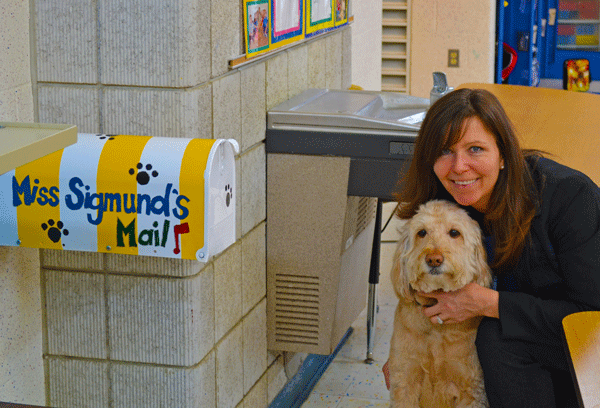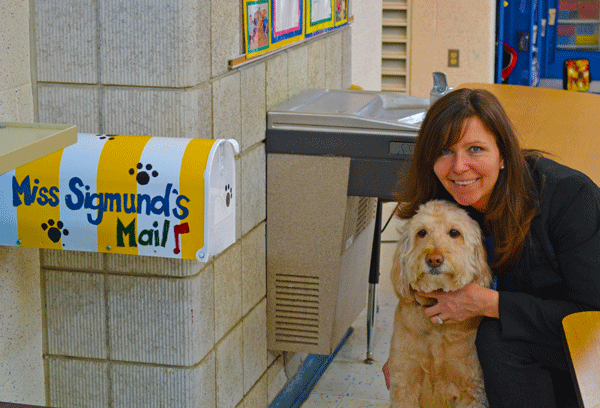 During the 2004-2005 school year, the Community Foundation for the Greater Capital Region gave a grant to the Guilderland School District to purchase Miss Lily Sigmund, a.k.a. Miss Siggy, a Goldendoodle who is also a trained social service support dog. In the decade since joining Guilderland Schools’ staff, Miss Siggy has helped countless students, under the guidance of Catherine Ricchetti, LCSW-R, Pine Bush Elementary School and Lynnwood Elementary School social worker.
During the 2004-2005 school year, the Community Foundation for the Greater Capital Region gave a grant to the Guilderland School District to purchase Miss Lily Sigmund, a.k.a. Miss Siggy, a Goldendoodle who is also a trained social service support dog. In the decade since joining Guilderland Schools’ staff, Miss Siggy has helped countless students, under the guidance of Catherine Ricchetti, LCSW-R, Pine Bush Elementary School and Lynnwood Elementary School social worker.
“Miss Siggy helps our work in a lot of capacities,” says Ricchetti. “She helps students with assertiveness training, with reading, or just as a reward. She’s especially helpful with shy kids or those who are anxious or school-phobic.”
In an average day, Miss Siggy might be read to by younger students, which eases students’ anxieties about reading aloud or making mistakes; or helping students learn to manage their emotions by calming themselves for Miss Siggy’s benefit. Miss Siggy has provided comfort for students on doctor’s visits, and visited the home of a school-phobic little girl to coax her into attending school. Several years ago, a school employee began taking Miss Siggy for regular walks, and in the process, lowered her own elevated blood pressure and stress levels.
Talking to adults about their concerns can be intimidating for children, so students also have the option to write letters to Miss Siggy. There are mailboxes around school where students can leave letters for Miss Siggy about problems or worries. Ricchetti answers as Miss Siggy, and Miss Siggy’s nonjudgmental, caring responses have helped students as they deal with issues such as bullying and family problems. In 2007, Ricchetti collected letters and responses in a book entitled, “Miss Siggy Speaks.”
Allison Millar, a master’s in social work student from the University at Albany, and Hansel Salcedo, an undergraduate student from Siena College, intern with Ricchetti and have seen Miss Siggy’s impact first-hand.
“This is my first time working in a school setting and with a social service support dog,” says Millar. “Miss Siggy helps us break the ice with kids. She makes visiting the social work office less intimidating, and she helps give the students a greater sense of responsibility by caring for her and learning to regulate their emotions around her.”
Social work support dogs were rarely used in school settings when Miss Siggy first came to Guilderland. Since then, schools across the nation have recognized the benefits of utilizing dogs to help students. The Guilderland School District’s program was one of the first, and has been featured on the cover of “New York Teacher Magazine” and in an online edition of “Social Work Today,” a national publication. Ricchetti has presented at a number of conferences on the success of the program. Requests for information on the program were so numerous that in 2007, Ricchetti published “Dogs in School,” detailing the techniques and effectiveness of having a social work support dog.
Miss Siggy has received extensive training to be an effective part of the Guilderland School District staff. She holds a Canine Good Citizenship degree from the American Kennel Association, and has been certified by Therapy Dog International. When not in school, she lives with Ricchetti and her family.
Due to the success of Ricchetti and Miss Siggy’s work, the Guilderland School District is planning to add another social work support dog to their staff in the near future.
“At the Community Foundation, we love our furry friends, so it’s wonderful how Miss Siggy and Catherine Ricchetti have been able to help students in Guilderland,” says Karen Bilowith, President and CEO, the Community Foundation for the Greater Capital Region. “This program is a perfect example of the Foundation’s investment in innovative and effective initiatives. Student success in school in the earlier years is a proven indicator for educational success later on. This program helps children develop as students and as people, and the Community Foundation is proud to support that work.”

